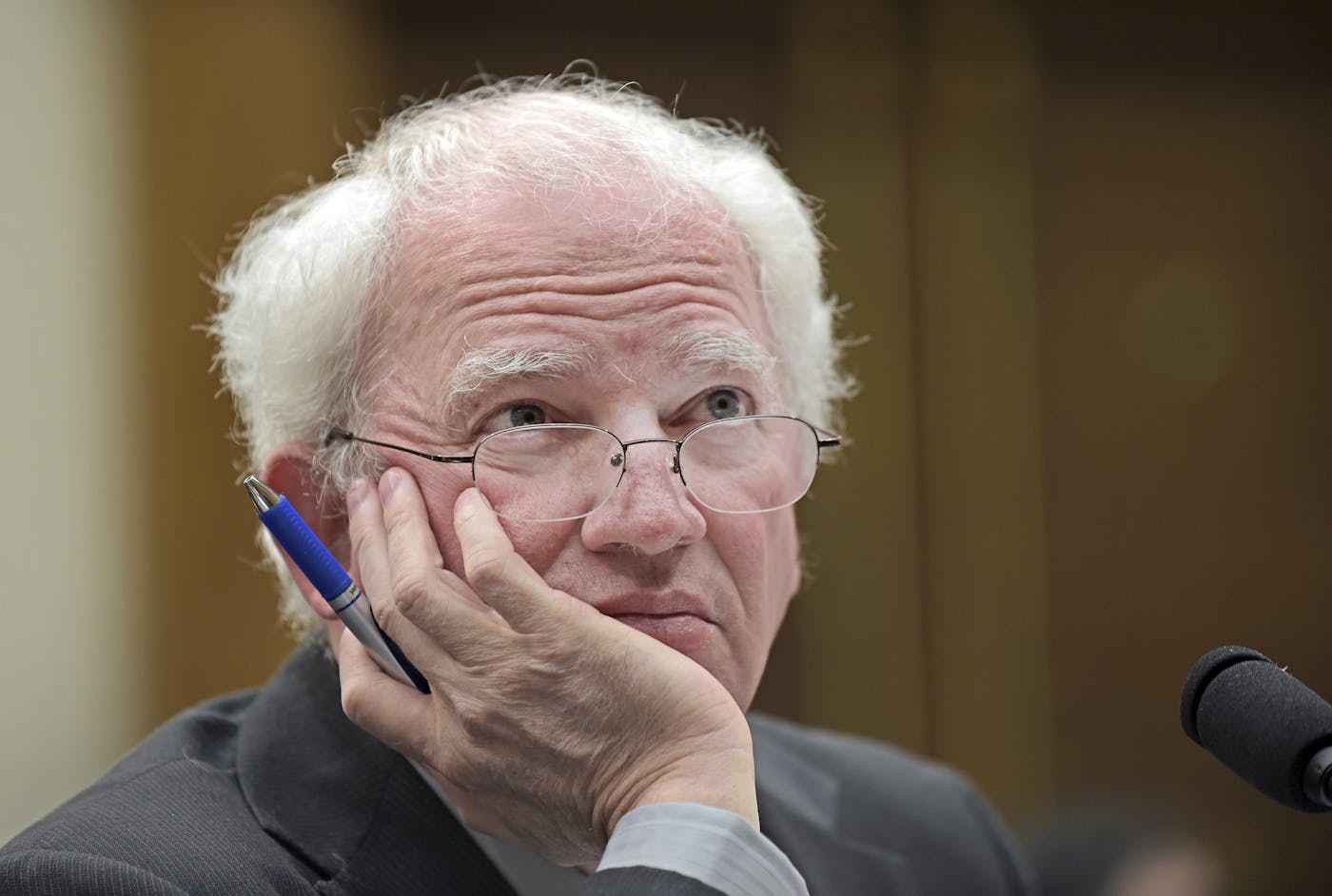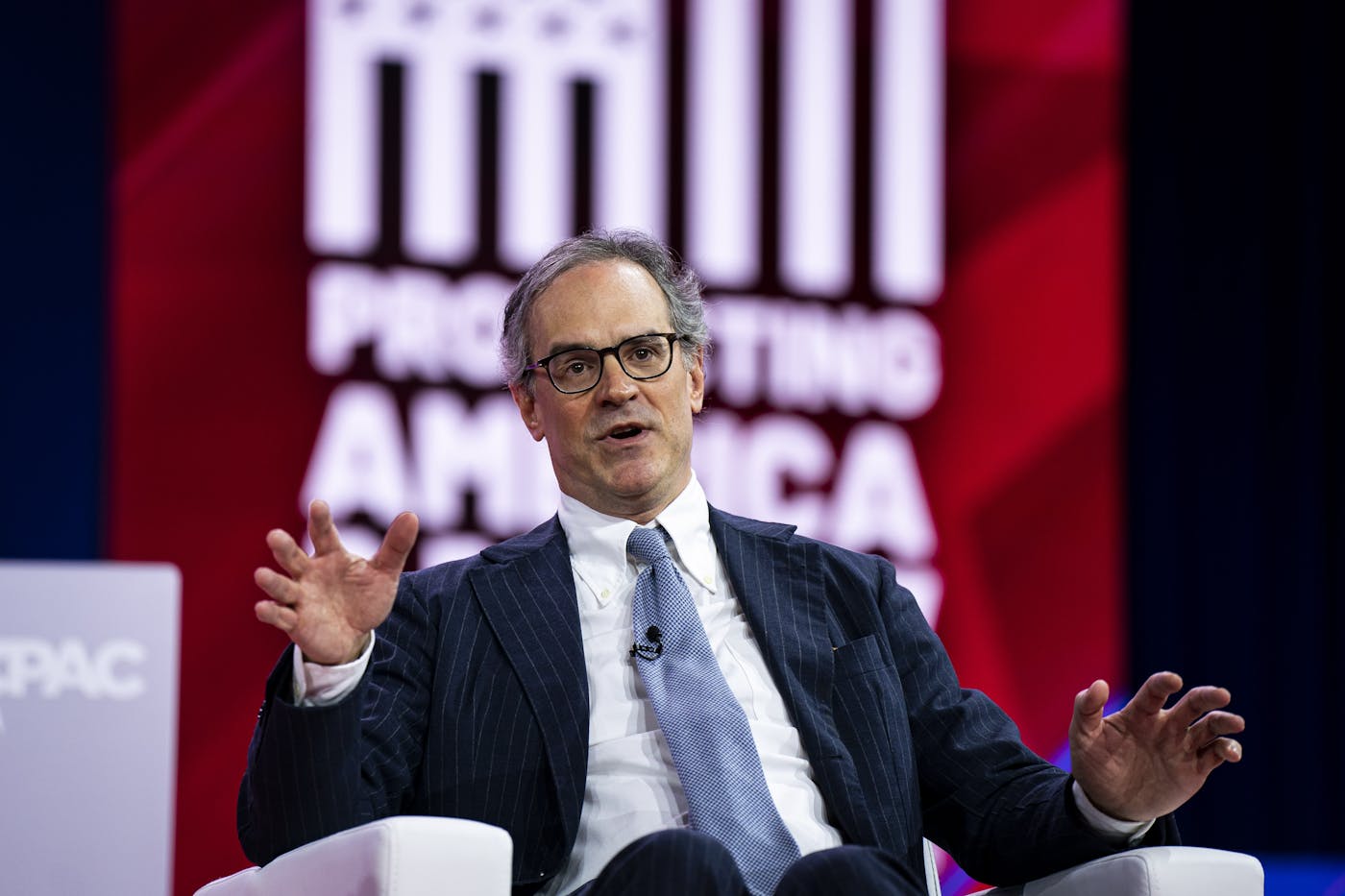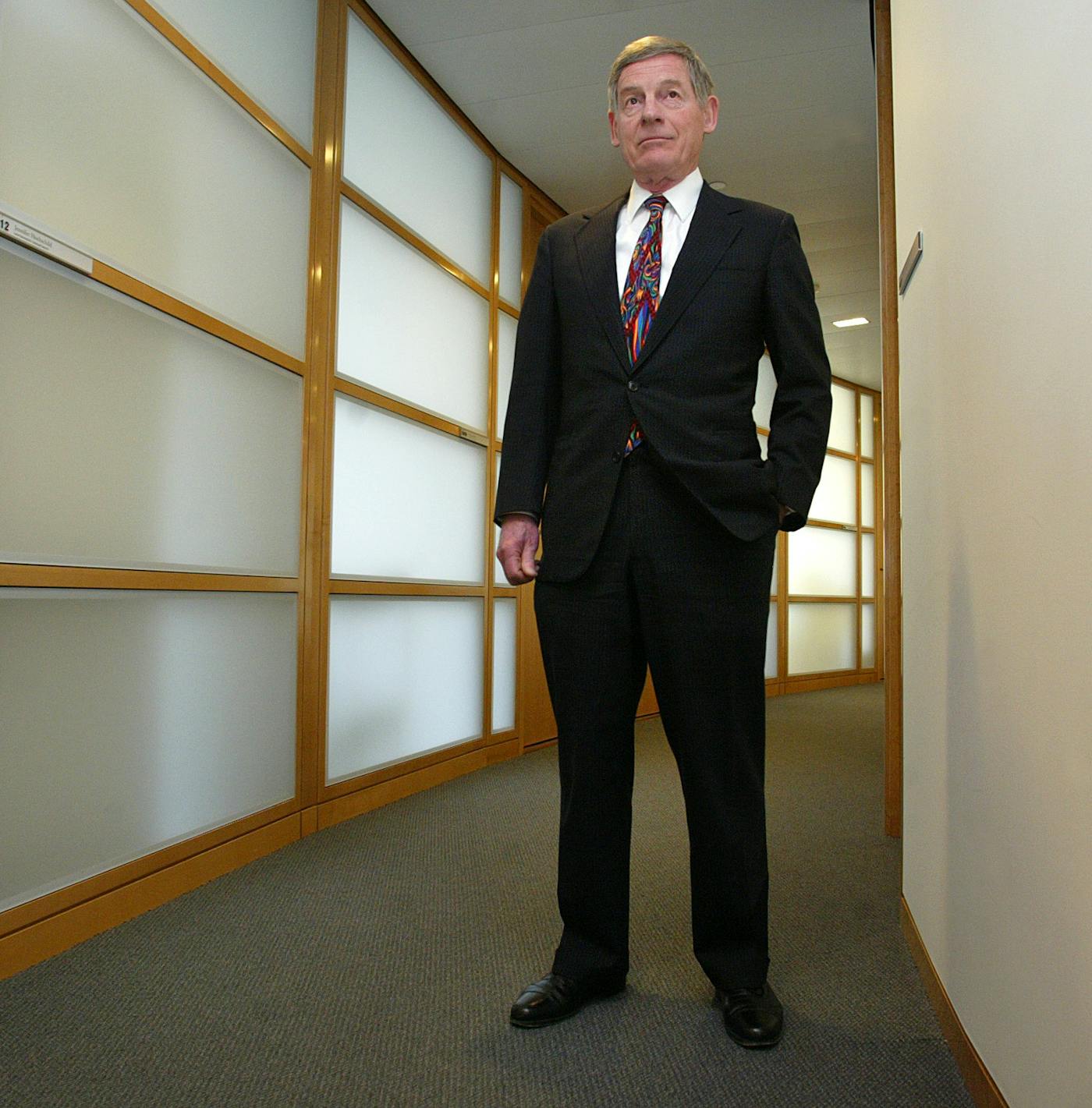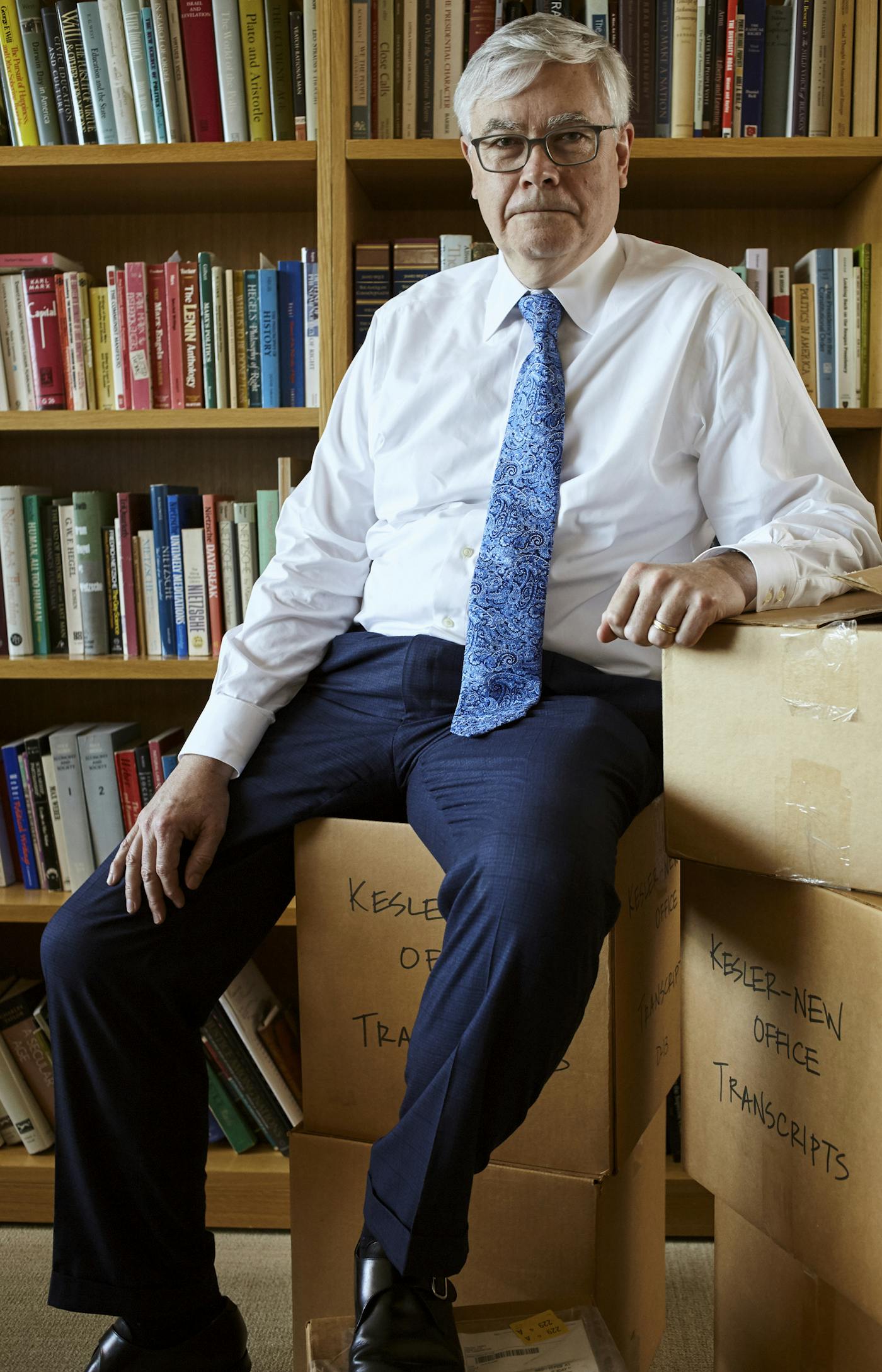In the age of Trump, it has been particularly important to report on the corruption of once-mainstream conservative organizations into the fetid Trumposphere. It has happened to so many of them, but nowhere with quite the thoroughness and finality of the Claremont Institute of California. Claremont was always very right-wing, just on the edge of respectable. But in the age of Trump, it has become something America hasn’t seen before: an openly anti-democracy think tank.
Katherine Stewart, a reporter with vast experience covering America’s right wing, dug deep for this piece into Claremont’s history, its key figures, and exactly how and when it took this odd but ominous turn toward pining for a “red Caesar” to take over America and run things. It’s a dazzling piece of reportage and intellectual history that will be read for as long as Claremont remains important.
—Michael Tomasky, editor, The New Republic
Earlier this year, nearly 1,000 supporters of “National Conservatism” gathered at the semicircular auditorium of the Emmanuel Centre, an elegant London meeting hall a couple of blocks south of Westminster Abbey, to hear from a range of scholars, commentators, politicians, and public servants. NatCon conferences, as they are often called, have been held in Italy, Belgium, and Florida and are broadly associated with what is increasingly called the “New Right.” In London, speakers denounced “woke politics,” blamed immigration for the rising cost of housing, and said modern ills could be solved with more religion and more (nonimmigrant) babies. The break room was lined with booths from organizations such as the Viktor Orban–affiliated Danube Institute, the U.K.-based conservative think tank the Bow Group, the Heritage Foundation, and the legal powerhouse Alliance Defending Freedom, which is headquartered in Arizona but has expanded to include offices in nearly a half-dozen European cities.
When I attended NatCon London in May, I heard a number of American accents in the crowd, and I was not surprised to see Michael Anton, a former national security official in the Trump administration and a senior fellow at the Claremont Institute, a right-wing think tank, on the lineup. These days, Anton and other key representatives of the Claremont Institute seem to be everywhere: onstage at the Conservative Political Action Conference (CPAC); at the epicenter of Ron DeSantis’s “war on woke”; and on speed-dial with GOP allies including Josh Hawley, J.D. Vance, and Donald Trump.
Most of us are familiar with the theocrats of the religious right and the anti-government extremists, groups that overlap a bit but remain distinct. The Claremont Institute folks aren’t quite either of those things, and yet they’re both and more. In embodying a kind of nihilistic yearning to destroy modernity, they have become an indispensable part of right-wing America’s evolution toward authoritarianism.
Extremism of the right-wing variety has always figured on the sidelines of American culture, and it has enjoyed a renaissance with the rise of social media. But Claremont represents something new in modern American politics: a group of people, not internet conspiracy freaks but credentialed and influential leaders, who are openly contemptuous of democracy. And they stand a reasonable chance of being seated at the highest levels of government—at the right hand of a President Trump or a President DeSantis, for example.
What is their worldview, their mission? It starts, of course, with a redefinition of America’s national identity. Launching into his NatCon speech, titled “Britain’s Grand Strategy for the 21st Century,” Anton hailed Brexit as “Britain standing up for herself against the globalist Borg.” With a sly swipe at U.S. support for Ukraine (“A Russia that has difficulty reaching, much less crossing, the Dnieper does not seem much like a threat to cross the channel,” he said), he was unequivocal in his assessment that “wokeism” is at the heart of the threat to the West.
“It is tempting to want to think of foreign policy in the traditional way, as threats from predatory empires and nation-states. But that is not the threat that we face today, not the main one,” Anton said. “This ideology was not born in our countries” but “has taken root here and in America. It has captured our elites and our institutions. And I am sorry to say we are partly to blame because so far, at any rate, we have failed to stop it.”
There is a story you hear from the podiums at gatherings like NatCon and CPAC, and if you go to enough of them, it will sound as familiar as a classic rock song. It goes something like this: The sum of all our problems—and the greatest threat that the American republic has ever faced—is the rise of the “woke” elite. Cosmopolitan, overeducated, gender-fluid, parasitic, and anti-Christian—the leaders of this progressive cabal worship at the shrine of Diversity, Equity, and Inclusion offices, which they use to elevate undeserving people of color and crush hardworking “real” Americans. They control “the regime,” or so the song tells us: “the administrative state,” the institutions of culture, law enforcement, even the military. Any and all means to annihilate the power of the woke, up to and including political violence and overturning elections, must be seriously considered if we (right-thinking Americans) are to “save our country.”
It’s not just the NatCon types who are humming this tune; it has permeated other sectors of the American right. In the run-up to the 2023 Road to Majority Policy Conference, an annual gathering of religious right activists, strategists, and politicians that took place in Washington, D.C., in June, seasoned Christian right strategist Ralph Reed sent out a fundraising email asserting, “Woke culture and anti-Christian, anti-American radicals drive our public life further and further from the Light of God’s Word.” From the main stage of the conference, Ron DeSantis railed against the “woke mind virus”; Vivek Ramaswamy took a swipe at the “administrative state”; and Josh Hawley asserted that “woke corporations” and “Marxists in the C-suite” are “pushing relentlessly this Marxist agenda, pushing relentlessly this religion of woke.” At the gala dinner, Trump delivered a rambling attack on his political opponents in the Democratic Party, whom he accused of “trying to impose their blasphemous creed of woke communism.”
Ironically, the folks pushing this rescue-America-from-the-woke narrative don’t look much like the hardworking “real” Americans they purport to speak for. Educated, urbane, politely attired —they look a bit more like the villains of the tale than the people who are supposed to be rising up against the regime. There is something detached from reality in this story about how one part of the upper middle class is going to save the country from the other part. Yet, under Florida Governor Ron DeSantis, this conviction has become something close to the official ideology of the third most populous state in the nation. Donald Trump too has shifted his rhetoric to claim ownership of what is, in essence, an ultra-MAGA narrative.
Why has so much of the American conservative movement embraced the story that the principles of equality and the pursuit of a more just society are the greatest threats to Western civilization today? Who or what is responsible for giving these paranoid ideas an intellectual veneer? The Claremont Institute gets you much of the way to an answer.
Founded in 1979 in the city of Claremont, California (but not associated in an official way with any of the five colleges there), the Claremont Institute provided enthusiastic support for Donald Trump in 2016. Individuals associated with Claremont now fund and help run the National Conservativism gatherings; Claremont Institute chairman and funder Thomas D. Klingenstein also funds the Edmund Burke Foundation, which has held those National Conservatism conferences across the globe. Claremont is deeply involved in DeSantis’s effort to remake Florida’s state universities in the model of Hillsdale College—a private, right-wing, conservative Christian academy in Michigan whose president, Larry Arnn, happens to be one of the institute’s founders and former presidents. Claremont honored DeSantis at an annual gala with its 2021 “Statesmanship Award,” and the governor returned the favor by organizing a discussion with a “brain trust” that included figures associated with the Claremont Institute. If either Trump or DeSantis becomes president in 2024, Claremont and its associates are likely to be integral to the “brain trust” of the new administration. Indeed, some of them are certain to become appointees in the administrative state that they wish (or so they say) to destroy.
“What the Hell Happened to the Claremont Institute?”
The saga of the Claremont Institute in the Trump years is readily told as one of moral collapse. Once upon a time, the men of the Claremont Institute (they are almost all men; more on that in a moment) idolized George Washington for his “prudence” and “civility.” From its founding up through the Obama years, the institute was certainly situated on the right, but it was not, or did not seem to be, conspicuous for its extremism. It was probably best known for publishing the Claremont Review of Books, which was sized and laid out to resemble The New York Review of Books, as if to suggest that it was in direct competition with its more established and exalted Manhattan counterpart.
But in 2015–16, the Claremont men threw their support behind the man who descended that golden escalator with a mouthful of hateful rhetoric. In an earlier time, they defended intellectual rigor against the alleged relativism of contemporary academic culture. But now they provide a platform for white nationalists, racist “replacement” theorists, and the Pizzagate man. Nate Hochman, the erstwhile DeSantis staffer who was fired after he reportedly created and distributed a campaign video featuring Nazi imagery in July, is a former Claremont Institute Publius Fellow (2021). ”Most haunting of all—they once hailed the United States as “the best regime in Western civilization.” But in the aftermath of Trump’s defeat in 2020, Claremont board member John Eastman was instrumental in the plot to recruit fake electors and overturn the election—and the men of Claremont rose to his defense. Eastman currently faces potential disbarment in California and appears to be a person of interest in special counsel Jack Smith’s investigations. Yet Claremont board member and founder Christopher Flannery has called John Eastman a “hero” and has asked us instead to condemn “the Stalinist machine” (meaning U.S. federal law enforcement) for persecuting him. Eastman was the unidentified (and uncharged) co-conspirator 2 in the August 1 indictment of Trump over his January 6 actions. (Claremont did not respond to emails from The New Republic asking if the institution endorsed Eastman’s behavior on this matter, in addition to some other issues addressed in this piece.)
The Claremont Institute’s seeming embrace of political violence against the government of the United States is not limited to Eastman’s efforts to whip up the mob that gathered at the Ellipse in preparation for the assault on the Capitol, nor can it be excused as mere metaphorical excess in the war of ideas. “Given the promise of tyranny, conservative intellectuals must openly ally with the AR-15 crowd,” argues author Kevin Slack, a professor at Hillsdale College, in a lengthy book excerpt published in Claremont’s online magazine, The American Mind. “Able-bodied men, no longer isolated, are returning to republican manliness in a culture of physical fitness and responsible weaponry. They are buying AR-15s and Glock 17s and training with their friends, not FBI-infiltrated militias or online strangers but trustworthy lifelong friends to build a community alongside.”

“What the hell happened to the Claremont Institute?” asks Laura K. Field, a senior fellow at the Niskanen Center and a scholar in residence at American University, in an insightful series in The Bulwark. Daniel W. Drezner has described the institute as “the poster child for the devolution of conservative thought.” Over at National Review, Mona Charen has written that Claremont “stands out for beclowning itself,” and adds that its fellows have “thoroughly jettisoned their devotion to truth and virtue.” In conversation with me, Bill Kristol dismissed the current incarnation of Claremont as “off-putting and depressing and stupid.” Steve Schmidt, co-founder of the Lincoln Project, was even more direct. Claremont, he told me, “is becoming like the West Point of American fascism. It has collected a creature cantina, like the Star Wars scene, and has nurtured and midwifed the birth of a political ideology” that “leaves most commentators deeply discomforted by calling it by its name.”
But is it really a story of decline? Or are we simply seeing the true face of the beast, now that it has stepped into the limelight of significant political power? “It’s not like there were no signs of ideological trouble or shortsightedness at the Claremont Institute going back nearly to the start,” Field told me. “The more I read, the less surprised I am.” In Kristol’s view, too, the signs were there. “If you look at the Claremont Review of Books 10 years ago, there were some intelligent articles.” However, Kristol noted, “What I would say is that some of them have fallen into legitimizing violence and really fundamental illiberalism. Not all of them are there.... But because they are so unwilling to call out extremists on their own side, I give them no credit.”
A broad survey of the Claremont Institute’s trajectory since its founding confirms Kristol’s intuition. The pathologies appear to have been present at the creation, too, and they have always seemed to matter more than any specific policy agenda or political personality that the institute supports. But the suggestion that the rise of the kind of disordered thinking that Claremont embodies is something that just happened to America’s conservative movement, as if by accidental impact with some outside force, is far too optimistic. Over the past five decades, wealthy conservatives have conducted a grand experiment in American political discourse by investing heavily in organizations and think tanks that have sought to shift the center of public debate in a direction favorable to their interests and privileges. The Claremont Institute is representative of the many operations that blossomed with this well-financed effort. The unintended consequences of the experiment are now the story. When you pay people to be unreasonable, you attract many unreasonable people. They drown out the reasonable people. And they just want to blow the place up.
The Intellectual Background, Part 1: Jaffa and Strauss
The intellectual origin story of the Claremont Institute begins in the 1970s with a circle of graduate students gathered around Harry Victor Jaffa, a charismatic professor of political philosophy. Jaffa’s story begins about three decades before that, when he experienced in the 1940s the equivalent of a red-pill moment.
Jaffa gratefully attributed this awakening from somnolent acceptance of relativism to his mentor, Leo Strauss, the German-born Jewish political philosopher who later found a home at the University of Chicago before his death in 1973. As a graduate student at Yale, by his own account, Jaffa had lived “within the historicist dogma that we are all prisoners of our own time, and that we had no access to any truth outside of it. Strauss frees one from this prison….” Plato’s dialogues, Aristotle’s treatises on ethics, and the rest of the works that he studied with Strauss are more than just great, Jaffa realized in his moment of clarity; they are the source of absolute truth, which is far more durable than the compromising relativisms of liberal dogma and reveals something that can be called “natural right.”
The other teaching that Jaffa took from Strauss is that the great philosophers don’t always say what they mean. According to Strauss, philosophers routinely engage in “esoteric” and “exoteric” writing. That is, they disguise their most important teachings in the face of political persecution (with which Strauss, as a German Jew who escaped to the United States, may have had some familiarity) and pass them along to followers in between the lines, as it were. The implication is that philosophical writings are deeply political. They have an external message, aimed at influencing the public in some way. But only their intellectual fellow travelers can decode the internal meaning of the texts.

Jaffa was a complex figure, and not without appeal to progressives. Central to the vision articulated in his seminal work on the Lincoln-Douglas debates of 1858, Crisis of the House Divided, is the argument that equality is the founding principle of the American republic, and that Lincoln achieved incomparable greatness in wielding this principle against slavery.
Strauss is even harder to pin down, politically speaking. A defining experience for him seems to have been the failure of the Weimar Republic, which he possibly took as a failure of liberalism. The theory of esoteric writing sometimes appears to rest on the premise that human society is incapable of the kind of rational, deliberative government that liberal democracy requires. Only Strauss and his followers can handle the eternal truths vouchsafed to us by the Greeks, it seems to suggest; most ordinary people must be content to live in what Plato called “the cave”—a state of permanent delusion.
Even such a brief review of this Straussian legacy raises some subtle questions. How do we know that absolute truth landed in the texts of Plato and Aristotle and not, say, Lao Tzu? If the real message was intended to be misread, how can we ever know that our self-appointed interpreters have decoded it correctly? The great minds of Claremont, however, do not do subtle. In their work, these tensions stand out as blatant contradictions.
A case in point would be the work of Charles Kesler. The long-time editor of Claremont’s book review, Kesler tends to show up in reporting on the Claremont Institute as its éminence grise, lending a patina of intellectual respectability. You can get a feel for Kesler’s style of Straussian natural rights analysis from his interpretation of the speech that Trump delivered at the Ellipse on January 6, 2021. Where Trump says that former Vice President Mike Pence and other Republican leaders in Congress would be “ashamed of themselves throughout history, throughout eternity” if they failed to overturn the election, Kesler sees proof that Trump believes in “a form of right, based not merely in history but in ‘eternity.’’’ Trump the Platonist—who knew?
Although it is usually unwise to judge a book by its cover, an exception can be made in the case of Kesler’s Crisis of the Two Constitutions (whose title is an homage to Jaffa’s book on the Lincoln-Douglas debates). Between the covers of Kesler’s sequel to Jaffa, readers will find potshots at “the 1619 riots” (Kesler’s label for the George Floyd protests of 2020); extended attacks on “multiculturalism”; analysis of why liberalism “looks increasingly, well, elderly” (hint: Joe Biden); representations of Donald Trump as a “truth-speaker”; and, of course, sweeping and deeply partisan generalizations about American history.
Fortunately, for those who might wish to access the underlying claims in Kesler’s book about American history, it’s all there on the cover. In a custom-drawn cartoon in shades of red and yellow, the U.S. Capitol stands in the distance, majestic and forlorn. Barring the entrance squats a nasty-looking monster with vaguely racialized features. It is labeled “the living Constitution.”
The monster represents the great evil of the world as Kesler appears to understand it. This evil is called variously “historicism,” “nihilism,” and, most despicable of all, “progressivism.” Historicism is the doctrine that we are all “prisoners of our own time,” to borrow Jaffa’s phrase; nihilism is the supposedly consequent view that there are no absolute truths or values; and progressivism is the self-destructive political program that afflicts people who are presumed to have mistakenly fallen for nihilistic historicism. In Kesler’s version of the history, the influence of the German philosopher Hegel (1770–1831) accounts for the rise of historicism, a gateway drug to nihilism, while the supposedly arch-progressive Woodrow Wilson is responsible for the creation of the dreaded “administrative state.”
Off to the right on Kesler’s book jacket, a small but heroic knight on horseback flies the flag of the true United States Constitution (“We the People,” it reads). Call him the white knight of Claremont; he tilts his lance in the direction of the beast of progressivism. In fact, in the cartoon, he looks set to storm the Capitol.
The book was finished before January 6, 2021, but came out about a month afterward. The timing was impeccable.
In Kesler’s version of American history, the Progressive Era is when the country’s decline began. Kesler is not alone in peddling a dark narrative of American collapse, though the dates and details can vary. As Laura Field explained to me, “One pattern I’ve noticed is that when they look back … it’s like they think there was some magical moment in history, a blip in time in 1866, 1933, or 1966, or what have you, when there was a perfect equilibrium, and all racial or civil rights problems were solved.” The absurdity of this proposition shows that the “creature cantina” at Claremont, as Steve Schmidt puts it, has little interest in learning from the study of the past. They are driven instead by the hatred of groups or aspects of life in the present that they map onto a fictional narrative involving an imaginary past. This isn’t intellectual history; it is cartoon history, rooted in some kind of reactionary pathology.
The Intellectual Background, Part 2: About Schmitt
One figure from the history who should matter in any assessment of the Claremont Institute, not in the official pantheon but not far below the surface either, is the ultraconservative German political theorist Carl Schmitt. Unlike Strauss, Schmitt is very easy to place, politically speaking. He was a Nazi and a vicious antisemite: not just a fellow-traveling Nazi, but an influential legal adviser to the regime who promoted book burnings, worked to destroy the careers of Jewish scholars and scientists, and refused to participate in de-Nazification after the war. And yet, he was instrumental in getting Leo Strauss the scholarship that helped him leave Germany in 1932; Strauss thanked Schmitt for providing him with “the most honorable and obliging corroboration” of his scholarly work that he had ever been accorded.
Like Strauss, Schmitt was unhappy with the Weimar Republic, which he perceived as unforgivably weak. He took his unhappiness out on the very idea of liberal democracy. Liberalism, he argued, is a failure because it refuses to acknowledge the distinction between “friend” and “enemy”—a distinction that he took to be the foundation of all politics. What makes humans special and genuinely political, according to Schmitt, is that they are willing to fight one another and die for a higher cause. The other defect of liberalism, according to Schmitt, is that it fails to acknowledge that the sovereign must be he who can act in a “state of exception” or “state of emergency.” That is, a ruler must be able to break all the rules, ostensibly in the name of the common good, or he isn’t much of a ruler at all.
At first glance, Schmitt’s friend-enemy distinction might sound like a way of separating citizens from “foreigners.” And indeed Schmitt, in works such as The Concept of the Political, pointed to enemies both foreign and domestic. But the main source of his appeal to contemporary conservatives is the latter. To today’s right, the more important enemies are those citizens (liberals and insufficiently conservative conservatives) who either fail to acknowledge that we have enemies or are supposedly plotting against the country. Trump (who may be presumed innocent of any direct knowledge of Schmitt’s work) explained the gist of the point at the 2022 Road to Majority conference. “The greatest threat facing this country is not our foreign enemies, dangerous as they may be,” he said. “The greatest threat is the internal enemy. And I think you all know who I’m talking about.”
Schmitt’s antisemitism, too, was more complex (if no less despicable) than it first appears. “The Jew,” in his thought, was the paradigm of the secularized, cosmopolitan, educated elite on which liberalism necessarily relies. While the nature of Schmitt’s antisemitism is the subject of some debate, observers note that it did not follow traditional theological patterns but was rooted in his political theory. His antisemitism was thus an expression of his anti-liberalism filtered through the grotesque racial prejudices of his time. Some of his successors would learn how to draw on the same anti-liberalism while dropping the antisemitism in favor of hating on other groups ostensibly playing the same role. “At a time of dizzying and dynamic technical change, instantaneous communication, abolished borders, and global, de-territorialized conflict, Schmitt proves a prescient guide,” Claremont contributor Aaron Zack wrote in his largely favorable review of Schmitt’s 1942 book, Land and Sea: A World-Historical Meditation, published in the Claremont Review of Books in January 2017. “It is well worth reading.”

This background is helpful in assessing the most infamous essay ever to appear in the Claremont Review of Books—or at any rate the essay universally thought to mark the birth of the new Claremont. Published in September 2016 under the byline Publius Decius Mus and later attributed to Michael Anton, “The Flight 93 Election” was said to make “the intellectual case” for Trump. The election of Hillary Clinton, Anton asserted, would be the equivalent of a terrorist attack on the United States. If we’re all going to die at the hands of the Al Qaeda–like Democrats, the argument went, we have no choice but to join the alternative.
A Clinton presidency would mean “pedal-to-the-metal on the entire Progressive-left agenda” combined with “vindictive persecution” of conservatives. Yet having established that as a given, Anton directs most of his polemic against the representatives of “Conservatism, Inc.”—that is, those squishy, closet liberals who are too sanguine about a Clinton presidency, and who fail to recognize that Trump is the only alternative and that the only answer is to rush the cockpit.
At the time, Bill Kristol characterized Anton as a minor-league Carl Schmitt, noting on Twitter, “From Carl Schmitt to Michael Anton: First time tragedy, second time farce.” In communication with me, Kristol emphasized the connection anew. “If you look at recent issues, it becomes like Carl Schmitt,” he said of the Claremont Review. “They are sending the message that extreme measures are needed to defend against the tyranny of liberal Democrats. They seem to want to blow through all the guardrails and are OK with that.”
The Pathologies of Manliness
Of Claremont’s 41 fellows and senior fellows, all but three are male, and nearly all appear to be white. All 19 board members appear to be male. Nevertheless, they seem extraordinarily preoccupied with their manliness.
Recently, The American Mind featured an interesting piece on that score from a frequent contributor who calls himself “Raw Egg Nationalist” (REN). REN is the author of a cookbook. He advocates “slonking,” that is, a diet he describes as part of “a physical and political ethic built around the massive consumption of raw egg.” The eggs are said to help with bodybuilding and other manly pursuits. (Remember Rocky Balboa arising before dawn and chugging down raw eggs?) But the benefits don’t end there! It turns out that raw eggs can also counteract “the globalists’ plan for world government.” In Tucker Carlson’s 2022 film, The End of Men, REN joins with other figures in the “manosphere” to link the consumption of animal products with a back-to-the-land nationalism meant to strengthen the traditional moral values of Western males.
The big problems with the world today, according to REN, include “the agricultural revolution and its consequences” and a “crisis of masculinity.” “We have it drilled into us, this instinctive revulsion for inequality in any form. And actually, I think we need to ask instead whether inequality has its uses,” REN muses. “Maybe men and women shouldn’t work together in the same spaces.” Another big problem would appear to be ugly people, by which REN seems to mean the kinds of people who show up at racial justice events. In an interview with Jack Murphy, who was a Lincoln Fellow at Claremont, REN has this to say about the Black Lives Matter protesters of 2020: “All of these people look the same. I mean, they are hideously ugly, malformed people.” REN’s publisher, as it happens, is Antelope Hill Publishing, otherwise known for its Nazi and white nationalist titles, such as Michael, a novel written by the young—I kid you not—Joseph Goebbels (“Antelope Hill Publishing is proud to present a new English edition….”).
REN is far from the only writer with woman problems to score a platform at the Claremont Institute (he’s written frequently for The American Mind). In 2021, a Boise State University political philosophy professor named Scott Yenor went viral—not in a good way—with a speech at the National Conservatism Conference in Orlando, Florida, in which he characterized women with professional aspirations as “medicated, meddlesome, and quarrelsome.” Yenor’s views could hardly have been news to Claremont. Six months previously, the institute had invited him to deliver a keynote on “Feminism and the American Future.” Yenor seized the opportunity to inveigh against women’s pursuit of economic security and a satisfactory sex life. He maligned the “pernicious trajectory of feminism” and argued that it is “fatal to family life and fatal to the country.”
Claremont hired Yenor to be the think tank’s inaugural senior director of state coalitions for its new center in Tallahassee, Florida. From his speeches and writings, it would seem his actual plan looks more like an affirmative action program for reactionary males. “Every effort must be made not to recruit women into engineering, but rather to recruit and demand more of men who become engineers. Ditto for med school, and the law, and every trade,” he said. According to Yenor, state officials should conduct civil rights investigations of academic programs (“especially colleges of nursing and education”) that attract larger numbers of women than men. Ron DeSantis’s wife, Casey, tweeted her support for Yenor’s appointment, saying, “Thrilled to welcome @scottyenor from the Claremont Institute to his new home in Tallahassee.”
As Bill Kristol observes, the fanaticism here is even worse under the surface. “They are not just against the legalization of same-sex marriage,” he said. “They are so extreme they are for permitting gender discrimination in salaries, changing divorce law to what it was 70 years ago, for criminalizing homosexuality. They don’t want to say that because of political reasons, but certainly you don’t get the sense that they feel any compulsion to restrain their extremist rhetoric.”
Setting aside the rabidly misogynistic agenda, the most curious thing about Yenor’s work is just how unserious it is. If you want to make the case that women’s struggle to realize inherent natural rights and secure equality under the law is connected to various social ills in some way, you could look in places for evidence to test that remarkable hypothesis. You might, for example, compare countries with different levels of gender equality, economic outcomes, life expectancy, and health measures. You would surely want to explain the inconvenient fact that some of the places that are least hospitable to women’s rights happen to be those with the worst social and economic outcomes for all people. You might consider that, around the world, the countries that seem to best satisfy Yenor’s urgent desire to keep the genders in their lanes are also among the most repressive, unsafe, nepotistic, economically unstable, and corrupt. You would, at the very least, want to consider alternative explanations for the collapse of marriage rates among working-class Americans and the decline in male health indicators, such as the erosion of working- and middle-class wages and job security, the decline in manufacturing, and the rise of a winner-take-all economy.
But Yenor doesn’t have to do analysis, because Claremont already gave him the answer. The culprit, ever and always, is relativism, historicism, nihilism, progressivism, “wokeism,” and—since it’s all the same thing to them—feminism. So if working-class men are suffering, that can only be because the “woke left” has mounted a merciless assault on—here’s a word Yenor uses a lot—“manliness.”
Manliness. Where exactly did that word enter the conversation? In the Claremont world, manliness is a bit of a dog whistle, and Senator Josh Hawley has blown on it hard with his recent book, Manhood. True to Claremont formula, Hawley traces the crisis to our departure from ancient sources. When we were schooled in the classics, we had “moral uprightness”: “Machiavelli called it virtù” (from the Latin vir, meaning “man”); and the Bible has “a mission for men.” You might think that the man who raised his fist on January 6 and then scurried as fast as his legs could take him from the manly men attacking the Capitol would see some complexity in the issue, but Hawley does not. The problem, as ever, is the “priests of wokery,” as he said at the 2023 Road to Majority Conference, who have apparently succeeded in infiltrating the C-suites and learned to dispense their toxic doctrines through the corporate hierarchy.
Hawley, Yenor, and REN, however, are just taking a page from an earlier chapter in Claremont history. The story of manliness at Claremont might be said to begin with Harvey C. Mansfield Jr., the author of the 2006 book Manliness. A fixture of the Harvard University government department for decades, Mansfield counts as nobility among Claremont’s extended family. His father, Harvey Sr., helped Harry Jaffa land a career-making teaching job; Harry introduced Harvey Jr. to Leo Strauss; Harvey Jr. was Charles Kesler’s teacher.
Manliness offers a lightly informed romp through some work in biology and the social sciences on gender and sex, from which we supposedly learn that gender stereotypes are all true. “War is hell but men like it,” and women will never make good soldiers because “they fear spiders.” The patriarchy is just a biological fact of life. “Lacking as women are, comparatively, in aggression and assertiveness, it is no surprise that men have ruled over all societies at almost all times,” Mansfield concludes. And that’s that.
Mansfield is at least twice as subtle as REN; he knows enough to divide manliness into two basic types. The bad type is “nihilistic.” In a neat exercise of philosophical jiujitsu, he argues that the real problem with feminism today is that it tries too hard to be “manly”—but (gotcha!) in the bad, nihilistic way. This is especially true for Mansfield’s bête noire, Simone de Beauvoir. As Diana Schaub elaborates in a retrospective on Mansfield’s book in the Claremont Review, “Manly nihilism was embraced by the woman warrior, Simone de Beauvoir, who refashioned it into radical feminism’s womanly nihilism.” If it sounds like Mansfield is blaming harlot Eve and her uppity sisters for ruining manliness for everyone, that’s because he is.

Mansfield is far too sophisticated—or perhaps too Straussian—to openly argue for stripping American women of the rights they have fought for over the past two centuries. The “‘public sphere,’” he insists, should remain “gender neutral.” But in the “private sphere” (don’t bother looking for any definition of how the spheres are distinguished), those highly accurate stereotypes should reign triumphant. Only by acknowledging that men alone can be properly manly can we retain the “moral moorings” of manliness, as Schaub sees it. Meanwhile, the need for men alone to perform manliness has been pretty much standard practice for non-gender-neutral societies from South Sudan to Taliban Afghanistan.
In short, Manliness is not the lowbrow male supremacy that bubbles up from the manosphere into the pages of The American Mind. It is the kindly, highbrow version of it. The raw egg fellow and Florida’s new thought leader on anti-woke education don’t represent a break with Claremont’s misogynist past. The novelty is just that REN and Yenor are departing from the Straussian code and saying the quiet part out loud.
Sticking It to the Bugmen
Apart from the “Flight 93” masterwork of intellectual Trumpism, Michael Anton contributed at least one other piece that, in a happier world, would mark a turning point in the history of the Claremont Review of Books. That would be his review of a book titled Bronze Age Mindset, whose author goes by the name Bronze Age Pervert (BAP) and has since been identified as Costin Alamariu, who received his Ph.D. in political philosophy from Yale.
BAP writes as if he were some modern-day Zarathustra descended from a mountaintop cyber-collective. “I was roused from my slumber by my frog friends, and I declare to you, with great boldness, that I am here to save you from a great ugliness,” he intones. (The “frog” meme is widely associated with the far-right blogosphere.) If a right-wing Yale Ph.D. student woke up one morning after another dateless night on 4chan and thought he was the second coming of Nietzsche, this is the book he might write.
BAP abhors women. He refers to them as “roasties” (a crude reference to female genitalia), “whores,” and “property.” The “liberation of women,” BAP whines, amounts to an “infection” from which the West “can’t recover without the most terrible convulsions and the most thorough purgative measures.”
He isn’t into gay people either. He thinks they represent “the most profound of social and political problem” (sic) of the modern world. Then again, as he recounts in his book, he managed to ejaculate without touching himself while gazing upon an ancient statue of a Greek boy; so perhaps he is part of the “problem”? For what it’s worth, Alamariu sprinkles his Twitter feed with images of muscled beefcake. Oh, and that Twitter feed is also a collection point for racial hate.
BAP thinks the Bronze Age was just great. This would be the same Bronze Age in which human sacrifice was widely practiced, a great many humans were enslaved to other humans, and more. But none of that bothers BAP, because he identifies with Achilles and the master race—those superior beings who ride herd over their inferiors without apology, without false ideas about human equality, without woke politics. “The free man is a warrior,” he says; “the only right government is military government.” He encourages his followers to join the military, where he seems to think they will be able to organize coups against womanly democracy (or as he, Yenor, and much of the manosphere call it, “the gynocracy”).
So why would Michael Anton want to promote this clinically perfect example of the resentment-addled misogynist? Perhaps it’s because they have in common the same imaginary enemy. Both hate “the left, or what I have termed the Bug-man,” as BAP puts it (Nietzsche’s term was “the last man”). Anton and others at Claremont, as we know, simply call them “the woke.”
The Bugmen, to stay with BAP, are the “pretentious bureaucrats” who harbor “titanic hatred of the well-turned out and beautiful.” They believe in “social justice” and “first-world regimented hygiene” (BAP doesn’t like clean, well-lit streets “made safe for women” because they kill “the mood of the city”). And they are right now operating a “global slave project” for the benefit of the “gynocracy.” To the finely tuned ears of Claremont, that sounds like a description of the Democratic Party.
BAP seems to agree. He tells his followers that a tactical alliance with conventional right-wingers “would get you 99% of what you want.” He urges political leaders who are persuaded by his plan to bring back the Bronze Age to “use Trump as a model of success.” But he is savvy enough to advise those of his followers who go into politics to disavow his work publicly, and even suggests they should attack it. Oddly, the men of Claremont have ignored this sage piece of Straussian advice.
Claremont has a deep bench when it comes to fascist enthusiasts, however, and it may have found a more presentable representative foil than BAP in Curtis Yarvin, a blogger sometimes described as a political theorist. Yarvin is very much on board with the anti-Bugmen agenda, but he spares us most of the male anxiety and faux-Nietzsche rhetoric. Mostly he delivers the message in the self-congratulatory patois of the tech bro: America needs a “reboot.” Napoleon and Lenin are to be admired because each was “a start-up guy.”
Yarvin’s term for those who rule the modern world is “the Cathedral” (though he has been known to slip into talk about “dark elves” and “hobbits,” too). His proposed solution, like BAP’s, is the iron fist. He thinks America needs a king, a dictator with total military power, and he offers tips on how a president might become such a kingly king. The plan: Ignore court rulings and laws you don’t like, and maybe have “taped behind your balls, a non-fungible token (NFT) which controls the nuclear deterrent. Now that’s power.”
Swaggering talk about a super-empowered dictator appears to have tremendous appeal to the men of Claremont. In their pseudoclassics way, naturally, they frame it as the rise of an American Caesar. How glorious! Sometimes, the reveries are tucked inside high-sounding language about “statesmanship.” The “man of action” is Claremont’s favorite character in Aristotle, mainly because, as in the case of Christopher Rufo, the former Claremont fellow behind the anti–critical race theory hysteria, the men of Claremont explicitly aspire to become such figures themselves.
What will the manly dictator do once in power, apart from smashing the Cathedral to bits? Yarvin has little to say on that point. Who cares about the morning after? Like BAP, he practices what Nietzsche called “grand politics.” It’s all about magnificent gestures and look-at-me explosions. Details are for the Bugmen.
Anton’s approach to the Caesar question is particularly revealing and provides an example of what Straussianism has come to mean at Claremont. In his 2020 book, The Stakes, along with his appearances on several podcasts, including a two-hour discussion with Yarvin, he frames the prospective rise of a fascist dictator as prophecy, not policy, and insists that he laments such an eventuality. But then he turns around and declares that we have a choice. On the inevitable slide into a post-constitutional order, we can have a Blue Caesar or a Red Caesar. The Blue version—a combination of “Hillary Clinton and Pol Pot,” according to American Mind contributor Charles Haywood—would, Anton writes, rally “all the power centers and commanding heights of our society” to the cause of the “state-directed persecution” of conservatives. The Red one would at least draw from the part of the population with high “social capital,” which is fit to manage the “necessities” of life—this appears to be Anton’s euphemism for Trump-supporting, non-ruling-class Americans. But such a Red Caesar is unlikely, says Anton, because—woe to us!—conservatives are still too weak and disorganized.
Anton pretends merely to offer predictions grounded in wisdom of the ancients. But his target audience would have little trouble deciphering the hidden message for today. “Me, I like, if not love, the idea of a Red Caesar,” gushes Haywood. Nathan Pinkoski, a Claremont fan writing for First Things, the go-to journal for right-wing theoconservatives, explains Anton’s communications strategy: “In good Straussian fashion, what he teaches is not what he says. With great moderation, he explicitly teaches us how to act prudently within the framework of the republican constitution; with great daring, he implicitly teaches us how to act prudently when the republican constitution is gone.” In other words, Straussianism at Claremont means pushing authoritarian fantasies in not-so-secret code while cosplaying ancient philosophers.
So, who gets to join the secret society of latter-day Greco-Roman authoritarians? A strange fact to remember is that Costin Alamariu, a.k.a. the Bronze Age Pervert, got his Ph.D. from Yale. Curtis Yarvin has degrees from Johns Hopkins, Brown, and the University of California, Berkeley. Anton is a graduate of U.C. Berkeley. Their hero Ron DeSantis has both Harvard and Yale on his C.V. Manly man Josh Hawley is Stanford and Harvard. Yes, Virginia, these very men are themselves the Bugmen. When they talk about sticking it to the administrative state or fantasize about having their dictator-buddy tell all the liberals to suck on it, they seem to be dreaming about revenge on the professors, administrators, and fellow students who were mean to them on their way up.
It is with that in mind that one can make sense of the strangest aspect of the Claremont pathology: its obsession with elite higher education.
Adventures in Higher Education: or, Claremont Goes to Florida for Spring Break!
Only last year, the Hamilton Center for Classical and Civic Education at the University of Florida was just an idea on a piece of paper. But it quickly picked up $3 million in state funding, thanks to advocacy from the Council on Public University Reform, a mysterious group whose representative, Joshua Holdenried, previously worked at the Heritage Foundation and has a long history of working with conservative religious causes. The Florida legislature then approved an additional $10 million. According to the Council on Public University Reform’s draft proposal, the center would hold the power to appoint its own staff and educators in classics, history, and the humanities without consulting the existing faculties at the university.
The nonprofit behind the Hamilton operation is headed by a Claremont Review contributor, and the center’s arrival was music to the ears of Claremont’s Florida man, Scott Yenor. A hint about the center’s ideas in civics education may be gleaned from its decision to hire Pinkoski, who took up his position as a visiting faculty fellow at the center around the same time he published a review in First Things of a key text in the white supremacist canon: Jean Raspail’s The Camp of the Saints.
Published in France in 1973, Raspail’s novel imagines the horror that unfolds when one million nonwhite immigrants land on French shores. The subhuman invaders, as Raspail describes them, wallow in their own feces and delight in trampling over the misguided liberals who thought to welcome and feed them. The book has long been a favorite among white supremacists, but Hamilton’s man thinks it is a work of “genius” that exposes the—you guessed it—“cancel culture” and “nihilism” that is stabbing the West in the back. The Camp of the Saints is “the most important dystopian novel of the second half of the twentieth century,” he writes. Move over, Handmaid’s Tale!
The Hamilton Center is one of many such centers springing up around the nation. It is also one piece of DeSantis’s plan for higher education in Florida, along with the makeover of New College. Rufo, the anti–critical race theory guru, now serves as a trustee of New College, the small, liberal-friendly state school that the governor hopes to convert into an ideologically right-wing academy. Joining him on the board, as noted above, is Charles Kesler.
Fortunately for us, Rufo has been as transparent about his plan for the nation’s universities as he was for whipping up the fraudulent hysteria on critical race theory. (“The goal is to have the public read something crazy in the newspaper and immediately think ‘Critical Race Theory,’” he explained on Twitter.) In a lecture delivered in the safe space of Hillsdale College, Rufo revealed that America’s universities—all of them, apparently, with the exception of Hillsdale and a handful of allies—are in the hands of the woke and discriminate rampantly against right-wingers. The time has come, said Rufo, to counter this nefarious tendency with a new, parallel university system that would hire the right people and fire the lefties, and teach a pedagogy more in line with his beliefs.
One person who gets it, by Rufo’s own estimation, is journalist and January 6 conspiracist Darren Beattie, whom Trump appointed to the commission that encourages the preservation of Holocaust sites. Beattie gushes about the results of the program in Florida so far, citing an unsigned piece in Revolver News, a right-wing outlet, that compares the right-wing reconquest of Florida’s university system with Napoleon’s lightning victory over the Austrians in 1805.
Beattie was too far out even for the Trump administration; he was fired after it emerged that he spoke at a conference attended by well-known white supremacists. A listserv for Claremont alumni swiftly accumulated messages of support for Beattie that included some amount of racist and white nationalist commentary, notably from alt-right troll and Holocaust denier Charles Johnson. That prompted some participants holding respectful positions to withdraw from the listserv; eventually, Claremont shut it down. But Johnson himself had been, in fact, a Publius Fellow at Claremont and a contributor to the Claremont Review. And he had scored a flattering foreword to his own book on Calvin Coolidge from none other than his eminence, Charles Kesler.

Why is Claremont helping to normalize white supremacist narratives? The political capital to be made from playing to racial grievance in the Trump era is perhaps too obvious to belabor. It is much more interesting to note that the tendency long preceded the Trumpian turn. The men of Claremont routinely complain, as Kesler does in his Crisis of the Two Constitutions, that the contemporary academy has it in for “dead white males.” It is tempting to dismiss such claims as just another grievance narrative from those living white males who feel themselves to be the true victims of discrimination in today’s America. But this would be to overlook the role that such grievances play in consolidating the Claremont position on intellectual history. In the meta-narrative that Claremont absorbed from Strauss and Jaffa, greatness comes from a distinctive civilizational tradition, one that got its start in Athens, then picked up something in Jerusalem to become “the West.”
The Claremonters generally do not, on balance, explicitly identify this tradition with a racial group. Some are savvy enough to include a smattering of people of color in their narratives (Frederick Douglass being a favorite). But their followers likely have little trouble grasping that the whole point of reviving The Camp of the Saints is to conflate the desire to preserve civilization with the fear of other races and peoples. John Eastman’s views on race may be presumed to be benign, but those of the Proud Boys who stormed the Capitol on January 6 are not. And yet the Proud Boys’ oath could just as well serve as a Claremont motto: “I am a proud Western chauvinist. I refuse to apologize for creating the modern world.”
A truly scholarly history would show that what we call “the West” is the work of human interactions spanning the globe. The fabled Greeks drew inspiration from as far afield as India, and many encounters with different cultures shaped history decisively. It is also clear that not every person who has mattered in the process was white or male. But Claremont doesn’t do intellectual history, properly speaking. There is a better name for what it does do, and that is identity politics.
Claremont has had few qualms about pursuing its version of identity politics across the board. Affirmative action is just fine, according to Claremont’s Florida model, as long as it is used to boost the kind of people who make the right sort of noises about the “gynocracy” and demonstrate an interest in white supremacist novels. The administrative state is a good thing—provided you can funnel taxpayer money to ideologically correct centers of learning. Meritocracy is the great American ideal, but only when “merit” is defined as advocating for what your ultrarich patrons already know to be true. Cancel culture is a good thing, too, as long as you are using state power to ban books you don’t like.
To be sure, there are some excellent critiques to be made of diversity programs, and maybe some of these critiques make it through the apocalyptic rhetoric coming out of Claremont. What you won’t hear, however, is any serious consideration that such programs came into being to address real problems in a diverse society with a long history of racial oppression and rank discrimination. That’s because the men of Claremont aren’t here to propose practical policy solutions to the problems facing America. They come to rile up a grievance-addled base and satisfy their own resentments—and to raise enough money to keep the circus on tour.
They Don’t Shoot Administrative States, Do They?
In his Crisis of the Two Constitutions, Kesler names “the administrative state” as both the ideal of “Progressivism” and the font of all evil. He appears to have borrowed most of the argument, along with the strange fable about Hegel and Woodrow Wilson, from John Marini, a senior fellow at the Claremont Institute whose association with the organization goes back to its very beginnings in the 1970s.
The critique of “the administrative state” has a long history and touches on issues of concern in any modern democracy. As noted by Dwight Waldo, the subtle political theorist and onetime federal official who brought the idea to attention in a 1948 book, the administrative apparatus of the modern state has emerged as a new and powerful political function, distinct in important ways from a traditional conception of the legislature and executive. The administrative state often attempts to justify its power through an ideology valorizing scientific efficiency and managerial expertise. Yet, as Waldo points out, government administrators engage in inherently political tasks; they seek negotiated solutions among constituencies, and they ultimately answer to a democratic people through their elected representatives. The sensible critique of the administrative state, then, is a complicated one. The point isn’t to destroy it—surely we’ll want to hold on to the air traffic controllers and food safety inspectors—but to ensure that it remains accountable to the people in a democratic polity.
But the Claremont Institute doesn’t do complicated, and Marini is a case in point. He is a black-and-white kind of thinker, and one can get a sense of where he locates the color line from his analysis of Donald Trump’s candidacy for president in 2016. Marini lauded Trump for his interest in “unifying the country” by “appealing to the common good.” And “Trump has appealed to the rule of law and has attacked bureaucratic rule as the rule of privilege and patronage.” In brief, Trump represented “an existential threat” to the administrative state, according to Marini, and the secret reason why many progressives oppose Trump is that they love nothing more than the smell of bureaucracy in the morning.
In Marini’s narrative, the administrative state is not to be reformed; it is inherently illegitimate. “The tacit premise of the rational state, and the defense of the administrative state,” he claims, “rests upon the assumption that the power of government cannot be limited,” which, in his reading, directly contradicts the wisdom that the Founders supposedly gleaned from Aristotle. Consequently, as his co-author, editor, and fellow Claremonter Ken Masugi writes, “The administrative state is the modern face of tyranny—an issue on which thinkers as diverse as Leo Strauss and Carl Schmitt apparently agree.” The references are apt indeed. Marini’s critique of the administrative state, and even his identification of Hegel as its evil mastermind, tracks Schmitt’s critique of the liberal (Jewish) order with uncanny precision.
So who, according to Marini, is to blame for the rise of the administrative state in America? Marini’s answer: The “knowledge elites in the bureaucracy” who have manipulated public opinion in a dastardly plot to advance their bureaucratic power. Shorter Marini: The Bugmen did it. So what are we to do about air traffic, food safety, the environment, defense? Who knows. Details. Go ask the Bugmen.
Four years of the Trump presidency afford us some insight now into what the “deconstruction of the administrative state,” to borrow Steve Bannon’s phrasing of the Claremont idea, looks like on the ground: epic levels of corruption, nepotism, incompetence, polarization, and politicization. The best illustration of the tendency, as it happens, comes from the tenure of Claremonter Michael Pack as head of the U.S. Agency for Global Media (whose flagship is Voice of America). Pack was president and CEO of Claremont Institute from 2015 to 2017. His reign at Voice of America began late in Trump’s term, lasted seven months, and ended two hours after President Biden took office. During those seven months, Pack “inspired multiple formal investigations and rebukes” from various federal and D.C. judges who found that he acted “illegally and even unconstitutionally,” according to NPR reporting. “I don’t think he had a plan other than to just blow the place up,” said Dan Hanlon—a former top aide to Trump’s chief of staff who was himself appointed by Trump to the agency. “We would come in at nine o’clock and stamp out at five o’clock,” Hanlon said. “And we played foosball all day. And we would just sit there, commenting about how absurd this whole thing was.”
Broadly speaking, the kind of anti-government nihilism that Marini preached and Pack practiced has two natural constituencies. The first consists of those people who generally do not suffer from discrimination and who, unaware of the role of the administrative state in creating and sustaining their privilege, see no place for government in securing their civil rights. The second consists of those economic interests whose activities cause harm (such as pollution or the degradation of communities) or depend on monopoly profits, and who therefore do not wish to be regulated. The Claremont Institute fills its rosters with members from the first group but fills its coffers with representatives of the second. If you want to understand the Claremont Institute phenomenon, the oldest adage of journalism is indispensable: follow the money.
What Money Buys When It Thinks It Is Buying Ideas
Apart from whatever small dollars it wrings from anxious recipients through its mass mailers, the Claremont Institute appears to get the largest chunk of its money from Tom Klingenstein, the New York–based finance executive who serves as its current chairman.
Claremont has other funders, too. The Sarah Scaife Foundation, the Bradley Foundation, Donors Trust and the Donors Capital Fund, and the Dick and Betsy DeVos Family Foundation—all have chipped in. These are among the same groups that top the list in funding climate science denialism; the privatization of public education; the reduction of taxes for the rich, especially of inheritance taxes; and other causes known to warm the hearts of billionaires.

The direct funding from ultrawealthy interests is really only part of the story of how money has made Claremont. Claremont heroes such as Ron DeSantis, Josh Hawley, and J.D. Vance are to an important extent creatures of the donor class. The money that these political leaders receive from their wealthy friends turns into power for Claremont.
It would be a simple story if the money flowing to Claremont was merely there in pursuit of financial self-interest—and to some extent it is. Many of the donors would love to deconstruct the administrative state, after all, since it stands in the way of many of their privileges and moneymaking activities. So they will put up with the raw eggs, the Bronze Age nuttery, the woman-hating, and all that, as long as it delivers lower taxes and “small government.”
But what can history tell us about this kind of compromise? What will happen to the moneyed interests if BAP gets his military dictatorship, or if Anton’s Red Caesar steps forth?
I put the question to Steve Schmidt, and he lit up with enthusiasm. He urged me to read a speech that Hitler gave in 1932 in Dusseldorf to an audience of business executives. Hitler makes an explicit argument against democracy, he said, and “it’s not an unsophisticated argument—it’s what Tucker Carlson said every night on Fox and now on Twitter.” The core of the argument, in its American form, is that “America needs a Caesar.” Why does America need a Caesar? “To protect freedom and liberty—because democracy threatens the privilege of those who ‘built the country,’” Schmidt continued: “All fascist movements require the cooperation and capitulation of conservative movements. The conservative party is the party that is devoured by fascism in any type of right-wing fascist descent.”
Having spent a fair amount of time exploring the mind of Claremont in preparation for this piece, I find Schmidt’s analysis extremely convincing. It does, however, leave me with a loose end that I think of as the Klingenstein problem. When we suggest that conservatives are cooperating with and capitulating to authoritarians, we are supposing that they still see the alliance in rational, transactional terms. We implicitly assume that they know that they are making a pact with the devil, and we fault them for a moral failure or perhaps a lack of foresight. But that doesn’t describe Klingenstein at all. He clearly has been drinking the same Kool-Aid that was intended for the working classes. He isn’t capitulating to the forces that promise to destroy the foundations of his own wealth and privilege; he actively wants to become one with them.
The kind of authoritarianism that Claremont is peddling did not happen to the conservative movement by accident. It is the predictable result of the massive investment that conservative money made over the past 50-plus years in polluting American political discourse with its massive complex of ideological factories. When you spend enough to spread unreasonable ideas, you will get an unreasonable society. You might even become a bit of a crank yourself. It goes back to a problem at least as old as Plato. If your power depends on lying to the people, that doesn’t make you noble. It just leaves you with a choice: Accept that you are a fraud, or embrace the lie.






